SoE

SCHOOL OF ENGINEERING


















Shiv Nadar University Delhi-NCR is a comprehensive, multidisciplinary, student-centric and research university. It was set up in 2011 by the Shiv Nadar Foundation, a philanthropic foundation established by Mr. Shiv Nadar, founder of HCL. The university is in the quest to become a globally acclaimed center for learning and innovation, and is the youngest university to be recognised as an Institution of Eminence by the Government of India. Through its innovative curriculum and interdisciplinary focus, the university is bringing a paradigm shift in higher education in India. Enabling students to accomplish excellence in their Major while pursuing other academic interests through various options under a Minor, the university inculcates critical thinking and problem-solving skills. The university's source of strength lies in its distinctive feature of providing education in a broad range of disciplines and the ability to go into depth in a particular area.
MULTIDISCIPLINARY CURRICULUM
At the undergraduate level, Shiv Nadar University offers combinations of Majors in chosen fields of study and Minors from many other disciplines.
In the decade since its founding, Shiv Nadar University has assembled an impressive cast of faculty members from the top universities in India and worldwide across various disciplines. Key advisors to the government, famous authors, and thought leaders in multiple fields teach and guide students at Shiv Nadar University.
The university focuses on research in its broadest sense: basic and applied research, interdisciplinary research, scholarly publications and creative expression. The cornerstone of the university's academic mission is its emphasis on undergraduate research through its flagship Opportunities for Undergraduate (OUR) program.
The university provides an exciting space for character, community building, and exchange of ideas. The classroom discussions often continue to the central vista of the campus, the library cafeteria and the beautiful palm groves on campus.
Students at Shiv Nadar University hail from 27 States and Union Territories in India and are selected through a rigorous admission process. The student body reflects diversity in culture, talent and perspective.

Almost all programs offered by the university are delivered on its fully residential, 286-acre green campus that provides all facilities and activities for a fine living.
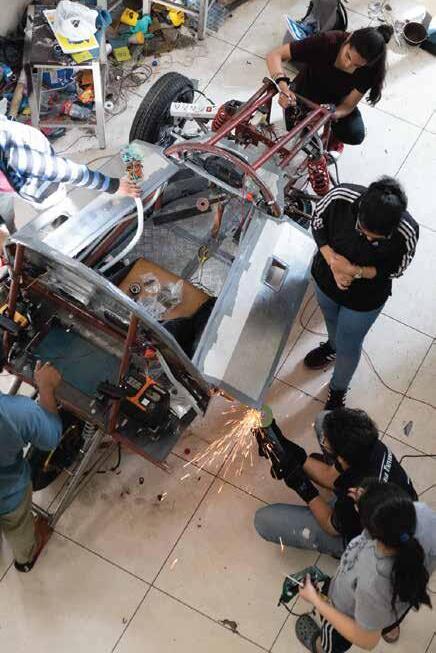
The School of Engineering (SoE) at Shiv Nadar University is a pioneering effort in engineering and aims to provide a world-class learning experience in the discipline. With innovative and engaging teaching methods, the School endeavours to hone engineers who specialise in their core discipline and are capable of shouldering leadership responsibilities in the 21st century.
The School combines research and education at the undergraduate level, providing students with a well-rounded experience. Each program in the School has been carefully customised in consultation with industry and academia to provide a balanced mix of theoretical and practical knowledge. The courses offered fall into the following categories: University Wide Electives (UWE); Core Common Curriculum (CCC); Research, Experiential and Applied Learning (REAL); and Values, Ethics, Leadership and Service (VELS). The university started the Engineering Majors in the Academic Year 2011-12 with approval from AICTE. There are 54 state-of-the-art laboratories in the School of Engineering.
The School offers Undergraduate and Doctoral programs in Chemical Engineering, Civil Engineering, Computer Science and Engineering, Electrical and Electronics Engineering, Electronics and Communication Engineering, Mechanical Engineering and Masters in Chemical Engineering, Civil Engineering, Computer Science and Engineering, and Mechanical Engineering.
In addition to the major branch, the School encourages students to broaden their education by choosing a minor within the School or even in departments from other Schools.
The School of Engineering also provides meritorious students with generous scholarships, financial assistance, internships and other opportunities to enable them to get the finest education.
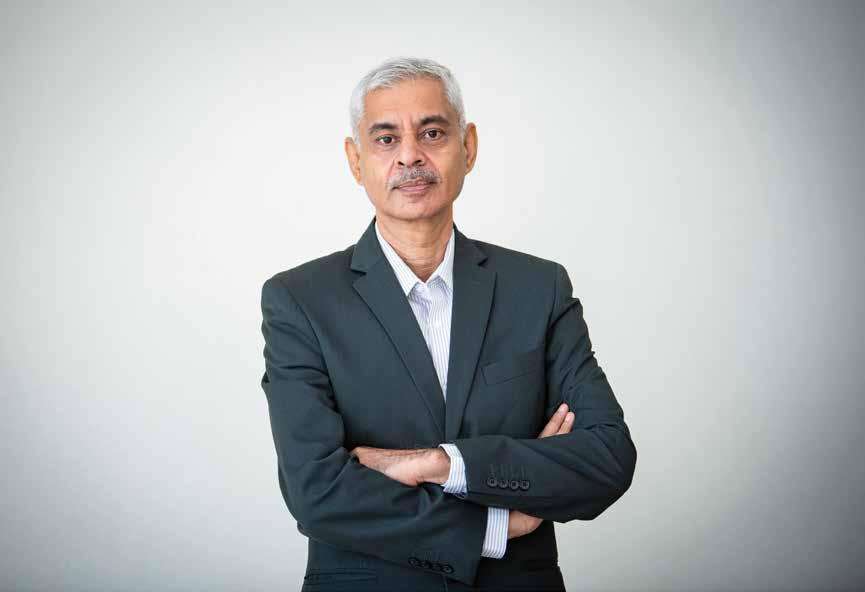

Professor, Department of Electrical Engineering
Dr. Suneet Tuli joined the Shiv Nadar University, Delhi-NCR, in June 2019. He leads the School of Engineering and the University Office of Dean Research and Partnerships. Dr Tuli had initially guided the university as Dean of Research, Dean of Graduate and Dean of Faculty Affairs, and Director, Accreditation and Regulatory Affairs.
Earlier, as a faculty at the Indian Institute of Technology (IIT), Delhi, for three decades, he served as Dean, Research & Development, Associate Dean Industrial Research & Development, and Head Centre for Applied Research in Electronics. Dr. Tuli received the 10th IETE Professor K. Sreenivas Memorial Award for distinguished teaching in 2003. He has been a visiting researcher in UK and France, collaborating in thermal-acoustic-electrical-optical interactions, non-destructive characterisation – active and passive thermography, and surface acoustic wave devices and electronic systems. He has also headed and participated in numerous research projects published widely and
A Ph.D. and M.Tech. in Electronics from IIT Delhi, Dr. Tuli holds BE (Honors) degree in Electrical & Electronics Engineering from BITS, Pilani.
Bachelor of Technology (B.Tech.) in Computer Science & Engineering
Specialisations: Artificial Intelligence and Machine Learning, Data Science and Big Data Analytics, Cyber Security and Privacy
Master of Technology (M.Tech.) in Data Science and Artificial Intelligence
Ph.D. (Full Time and Part time) in Computer Science and Engineering
Specialisations: Artificial Intelligence and Machine Learning, Data Science and Engineering, Theoretical Computer Science Modelling and Simulation, Security and Privacy Wireless-Mobile Computing and Networking
Representative Courses*
Physics, Mathematics, Introduction to Computing and Programming, Electrical Engineering, Digital Image Processing, Data Structures, Computer Organization, Digital Electronics, Operating Systems, Software Engineering, Computer organization and Architecture, Database Systems, Design and Analysis of Computer Algorithms, Computer Networks, Internet and Web Systems, Wireless and Mobile Systems, Information Theory, Wireless Sensor Networks, Data Mining and Data Warehousing, Internet of Things, Artificial Intelligence, Machine Learning, Deep Learning, Computer Vision, Information Security, Analytic cryptography.

and trends in the field of Computer Science and Engineering foster an environment of creativity, innovation and research.
The state-of-the-art laboratories are equipped with tools and technologies for all core courses and electives that are based on our four broad domains of research, (a) Artifical Intelligence and Machine Learning, (b) Data Science and Engineering, (c) Wireless, Mobile Computing and Networking, and (d) Security and Privacy.
*This is not an exhaustive list. The courses given in this booklet are reviewed every semester based on the requirement of the program. New courses are added every semester.
Dr. Sandeep Sen
Senior Professor, Ph.D., Duke University
Dr. Harish Karnick
Adjunct Professor, Ph.D., IIT Kanpur, India
Dr. Saroj Kaushik
Honorary Professor, Ph.D., IIT Delhi
Dr. Anupam Basu
Honorary Professor, Ph.D., IIT Kharagpur, India
Dr. Karmeshu
Honorary Professor, Ph.D., Physics, University of Delhi, India
Dr. Dolly Sharma
Associate Professor and HOD, Ph.D., University of Connecticut, CT, USA
Dr. Rajeev Kumar Singh
Associate Professor, Ph.D., JNU, Delhi
Dr. Sonia Khetarpaul
Assistant Professor,Ph.D., Indian Institute of Technology Delhi, India
Dr. Pooja Malik
Assistant Professor
Ph.D., Gautam Buddha University, Greater Noida, India
Dr. Snehasis Mukherjee
Assistant Professor, Ph.D., Indian Statistical Institute, Kolkata, India
Dr. Sweta Mishra
Assistant Professor, Ph.D., Indian Institute of Information Technology Delhi, India
Dr. Saurabh Shigwan
Assistant Professor, Ph.D., IIT Bombay, India
Dr. Sheel Sindhu Manohar
Assistant Professor, Ph.D., Indian Institute of Technology Guwahati
Dr. Shankar Ghosh
Assistant Professor, Ph.D., Indian Institute of Technology Guwahati
Dr. Nitin Kumar
Assistant Professor, Ph.D., IIT Bombay, India
Dr. Archit Somani
Assistant Professor, Ph.D., IIT Hyderabad, India
Dr. Sweta Kumari
Assistant Professor, Ph.D., IIT Hyderabad, India
Dr. Suchi Kumari
Assistant Professor, Ph.D., NIT Delhi, India
Computational Geometry, Algorithms and Complexity
Automata and Commonsense reasoning, Artificial Intelligence, Programming Languages
Artificial Intelligence, Social Network Analysis, Natural Language Processing, Evolutionary Computation
Embedded Systems, NLP, Assistive Technology, Natural Interface Design, HCI and ICT4D
Stochastic Modeling and Simulation, Comp. Neuroscience, Performance Modeling
Social and Information Networks, Computational Biology and Bioinformatics
Communication Engineering, Mathematical Modeling, Data Science, Computational Finance, ML
Social network analysis, Querying and Mining Spatio-Temporal Data, Information Retrieval, Data Mining
Artificial Intelligence, Machine Learning, Natural Language Processing, Machine Translation
Computer Vision, Image Processing, Machine Learning and Graphics
Theory and Practice of Cryptography, Password-based Cryptosystems, Biometric security and Information Security
Theory and Practice of Cryptography, Password-based Cryptosystems and Biometric security
Computer Architecture, Memory system hierarchy, Parallel computer architecture
Mobile computing, Heterogeneous networks, Physical layer security, Performance Modeling for Computer Networks
Machine Learning, Medical Image Computing, Computer Vision, Graph Representation Learning
Blockchains, Concurrent Data Structures, Dynamic Distributed Algorithms, and Persistence Memory Mode
Blockchains, Dynamic Distributed Systems, Parallel and Concurrent Programming, High Performance Computing, Progress-guarantee in Software Transactional Memory Systems, and Nested transactions
Network Science, Computer Network, DBMS, Cloud Computing
Bachelor of Technology (B.Tech.) in Civil Engineering
Specialisations: Structural Engineering, Geotechnical Engineering, Hydraulic Engineering, Environmental Engineering, Transportation Engineering
Master of Technology (M.Tech.) in Civil Engineering
Ph.D. in Civil Engineering
Physics, Mathematics, Introduction to Computing and Programming, Engineering Mechanics, Engineering Graphics, Strength of Materials, Building and Construction Materials, Surveying, Concrete Technology, Fluid Mechanics, Hydraulic Engineering, Engineering Hydrology, Water Resources Engineering, Structural Analysis, Soil dynamics, Spatial Analysis and Digital Image Processing, Design of Reinforced Concrete Structures, Fracture Mechanics, Transportation Engineering, Design of Steel Structures, Estimating, Costing and Project Management, Geotechnical Engineering, Foundation Engineering and Design, Environmental Engineering, Transportation Systems, Public Transport, Transportation Planning, Remote Sensing and GIS, Watershed Management, Hydropower Engineering, Earthquake Engineering, Finite Element Analysis, Natural Hazards and Disasters, Structural Health Monitoring, Environmental Management in Industries, Air Quality Science and Engineering, Biological Processes in Environmental Engineering, Sustainable Infrastructure, Constitutive Modelling of Geo-materials, Repair method of structures
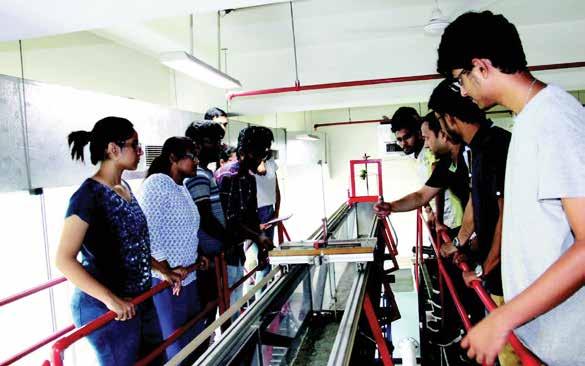
challenges. The practice of civil engineering is in a transition phase, and civil engineering programs in India are trying to adapt to the changing scenario through interdisciplinary approaches. As a result, the core civil engineering specialisations, including structural, geotechnical, environmental, water resources, transportation, construction, and geo-informatics engineering, are finding ways to develop common interest in investigating domains within the Department and with other engineering disciplines. Through its broad spectrum of core and elective courses at different levels, the Department aims to develop technical and scientific expertise. The undergraduate curriculum is designed to mould students into excellent engineers by exposing them to different aspects of Civil Engineering (Environmental Engineering, Geo-informatics, Geotechnical Engineering, Structural Engineering, Water Resource Engineering and Transportation Engineering).
*This is not an exhaustive list. The courses given in this brochure are reviewed every semester based on the requirement of the program. New courses are added every semester.
The Department has highly skilled faculty members with diverse backgrounds and has expanded the scope of teaching and research beyond traditional civil engineering to nurture young minds' talent and define new horizons. The curriculum has been designed to equip students with robust skills to become outstanding engineers who can engage with management studies to consider the larger social, economic, and environmental ramifications of civil engineering in industrial, research, and entrepreneurship works. Apart from this, the state-of-the-art laboratory facilities, world-class infrastructure, and adequate computational power will ensure the all-round development of our students. Considering the importance of industrial interaction and understanding practical problems, various workshops, conferences, and industrial training are organised during the course. With a wider academic background and first-hand industrial experience, students can gain high-end skills to intellectually solve industry challenges.
Dr. Ghanshyam Pal
Associate Professor and Head, Ph.D., University of Mississippi, USA
Dr. Gurmail Benipal
Professor, Ph.D., Indian Institute of Technology Delhi, India
Dr. Sailesh Narayan Behera
Associate Professor, Ph.D., Indian Institute of Technology Kanpur, India
Dr. Gyan Vikash
Associate Professor, Ph.D., Indian Institute of Technology Kanpur, India
Dr. Sumedha Moharana
Associate Professor, Ph.D., Indian Institute of Technology Delhi, India
Dr. Gopal Das Singhal
Associate Professor, Ph.D., Indian Institute of Technology Roorkee, India
Dr. Jagabandhu Dixit
Associate Professor, Ph.D., Indian Institute of Technology Mumbai, India
Dr. Shalini Rankavat
Assistant Professor, Ph.D., Indian Institute of Technology Delhi, India
Dr. Susant Kumar Padhi
Assistant Professor, Ph.D., Indian Institute of Technology Guwahati, India
Dr. Hitesh Upreti
Assistant Professor, Ph.D., Indian Institute of Technology Roorkee, India
Dr. Ellora Padhi
Assistant Professor, Ph.D., Indian Institute of Technology Kharagpur, India
Dr. Manoj Kumar Singh
Assistant Professor, Ph.D., Indian Institute of Technology, Delhi
Dr. Atri Nath
Assistant Professor, Ph.D., Indian Institute of Technology Kharagpur, India
Building physics and sustainability, novel cementitious composites, multiscale numerical modelling
Constitutive modeling, Damage-elastoplasticity, Chemo-thermo-viscoelasticity, Nonlinear dynamics, Stability and Cable dynamics.
Air quality monitoring & modelling; Fate & control of water/wastewater contaminants; Solid Waste Management; Water-Air-Soil Interactions.
Constitutive Modelling of Frictional Materials, Physics of Granular Materials, PoroMechanics, Computational Geomechanics
Structural health monitoring, smart material and structures, damage quantification and prediction using piezo vibration characteristic, analytical formulation of integrated sensor-structure system, non-destructive evaluation and system identification
Hydraulic Structure, Piano Key Weir, Fuse Plug, , River Basin, Irrigation Management and Crop Modelling Applications
Natural Hazards and Disaster Risk Reduction, Disaster Mitigation and Emergency Management, Earthquake Engineering and Structural Dynamics, Soil Mechanics and Foundation Engineering
Transport planning and policy, Traffic safety, Public transport and NMV planning
Biological Processes in Environmental Engineering, Biological Treatment of Wastewater and Waste Gas, Membrane Technology for Wastewater treatment, Air Pollution Control
Evapotranspiration, Remote sensing in hydrology, flow in unsaturated soil and root water uptake, Irrigation hydrology
Turbulence in open channel flow, Sediment transport Phenomena, Flow in compound channel, Dunal flow, River meandering
Thermal Comfort and occupant's Behaviour in Built Environment, Bioclimatic Building Design and Sustainability, Building Energy Simulation
Constitutive modelling, including plasticity, Fatigue of metals, High strain rate behavior
Bachelor of Technology (B.Tech.) in Electrical and Computer Engineering
Specialisations: Modern Energy Systems • Analog/RF and Communication Engineering • Embedded Systems and Computer Engineering • Sensors and Nanoelectronics.
Master of Technology (M.Tech.) in VLSI Design and Embedded Systems
Ph.D. (Full Time and Part Time) in Electrical Engineering / Electronics and Communication Engineering
Specializations: Wireless Communication, Signal Processing, RF & Microwave, VLSI, IoT, Machine Learning, Modern Energy Systems.
Basics of Electrical and Electronics Circuits, Introduction to Computing and Programming, Data Structures, Semiconductor Devices, Signals and Systems, Digital Electronics, Electric Machines and Power Systems, Analog Electronic Circuits, Control Systems, Embedded Systems Hardware, Electromagnetic Engineering, Principles of Communication Engineering, Computer Communication Networks, VLSI Design, Power Electronics and Machine Drives, Digital Signal Processing, Computer Organization and Design, Object Oriented Programming, Artificial Intelligence and Machine Learning, Deep Learning, Internet of Things, Wireless and Mobile Communication, Digital Communication, Information Theory and Coding, Microwave Engineering.
*This is not an exhaustive list. The courses given in this brochure are reviewed every semester based on the requirement of the program. New courses are added every semester.
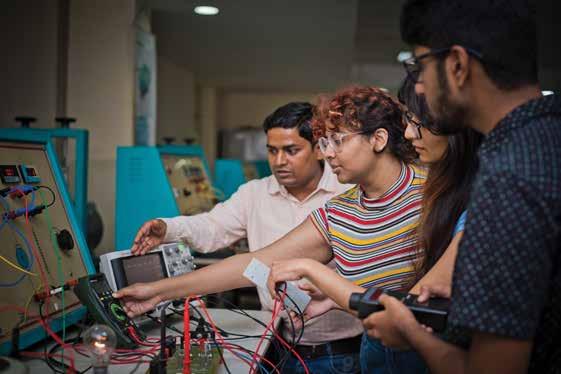
analyse, and implement real-life complex systems.
The Electrical Engineering Department's vision is to be a catalyst in imparting quality education and conducting valued research for the benefit of society. Historically, the field of electrical engineering is one of the most essential engineering disciplines that have changed the course of the world. Some of our significant teaching areas are electrical machines and drives, power electronics, power systems, integrated circuits and systems, control systems, machine intelligence, communication systems and signal processing.
The Department aims to establish itself as a centre of excellence in research and teaching in its chosen areas and is committed to establishing human and material infrastructure. The Department imparts quality education through its well-structured undergraduate and doctoral programs. The undergraduate program is a broad-based program founded on the pedagogy of learning by doing. It provides avenues for research. The doctoral program conducts research in fundamental and applied areas for societal use. It enables students to gain high-end skills for intellectually challenging careers in the industry.
Dr. Vinod Sharma
HoD & Professor, Ph.D., Carnegie Mellon University, USA
Dr. Dinkar Prasad
Professor, Ph.D., IIT Kharagpur, India
Dr. Rakesh Bansal
Professor, Ph.D., University of Connecticut, Storrs
Dr. Govind Sharma
Professor, Ph.D., University of Southern California, Los Angeles
Dr. Vijay Kumar Chakka Professor,
Ph.D., NIT Trichy, India
Dr. G Naveen Babu
Associate Professor, Ph.D., JIIT-Noida, India
Dr. Sonal Singhal
Associate Professor, Ph.D., IIT Roorkee, India
Dr. Atul Vir Singh
Associate Professor, Ph.D., IIT Delhi, India
Dr. Madhur Deo Upadhyay
Associate Professor, Ph.D., IIT Delhi, India
Dr. Amit Bakshi
Associate Head & Associate
Professor, Ph.D., IIT Bombay, India
Dr. Venkatnarayan Hariharan
Associate Professor, Ph.D., from IIT Bombay
Communication Networks, Wireless Networks, Information Theory
Electrical Machines and Drives, Power Electronics
Information Theory, Sequential Change Detection, Detection theory, Statistical Robustness
Digital Communication, Wireless Communication, Digital Signal Processing, Statistical Signal Processing, Detection and Estimation Theory, Image and Video Signal Processing
Communication Enginnering, Signal Processing, Deep learning on Graph neural networks
Electromagnatic Engineering, Microwave Tubes, Antennas, Metamaterial based electromagnetic structures, Machine learning, Deep learning
Ageing-aware novel CMOS logic architectures, In-Memory computing architecture, spiking neural networks, and development of low-power sensor nodes for Internet-of-Things applications.
MEMS Technology, Microelectronics, Semiconductor Materials and Devices
Active and passive circuits for RF & Microwave, RFID, EMC/EMI, Antennas: Passive & Active Antenna, OAM Antenna, MIMO Antenna
Short-circuit mechanical strength analysis of power transformers, Low frequency electromagnetic analysis, Homotopy analysis method to solve nonlinear differential equations
Modeling of semiconductor devices and on-chip interconnects, CAD algorithms for VLSI, Technology-circuit interactions, Computer organization and design
Dr. Amitabh Chatterjee
Associate Professor, Ph.D., University of California, Santa Barbara, USA
Dr. Kamal Singh
Assistant Professor, Ph.D., IIT Bombay
Dr. Himanshu Sekhar Sahu
Assistant Professor, Ph.D., IIT Guwahati, India
Dr. Jitendra Prajapati
Assistant Professor, Ph.D. IIT Guwahati, India
Dr. Upendra Kumar Pandey
Assistant Professor, Ph.D., University of Calabria, Italy
Modelling and Simulation of Semiconductor Devices and Circuits, WBG Power Electronics, TCAD of Advanced Materials & Scaled Devices, VLSI - Power & Analog , Ultrafast Lasers & Electronics
Multi-antenna Communication systems for 5G/6G Wireless, Information-theoretic aspects of Wireless Communications
Integration of Renewable Sources with the Grid, Photovoltaic Power System, Distributed Generation and Power Quality, Renewable Energy
Terahertz Radiation, Terahertz Antennas, Photoconductive and Photomixing Antennas, Teraherz Applications, Terahertz Sensing, Microwave Devices and Antennas
Fundamental studies on charge transport in organic semiconductors.
Metal Halide Perovskite Devices: Analysis of alternate hole and electron transporting Materials and interface engineering for greater Stability and Efficiency
Organic Solar Cell: Assessment of novel Donor-Acceptor materials for improved Stability and Efficiency
Dr. Rohit Singh
Assistant Professor, Ph.D., IIT Indore
Dr. Sandeep Soni
Assistant Professor, Ph.D., IIT (BHU) Varanasi, India
Dr. Kamal Agarwal
Assistant Professor - Ph.D., IIT Delhi India
Nanoelectronics, Embedded Systems, Internet of Things
Nonlinear Control Systems, Multiagent Systems, Control Applications to Robotics and Power Electronics
Physical layer layer aspects of wireless communication for 5G and 6G, Wireless powered communication, Aerial communication, Underwater wireless optical communication, Next generation multiple access, Device to Device communication Reconfigurable Intelligent surface, Backscatter communication, Integrated sensing and communication.
Mr. Aakash Sinha
Assistant Professor of Practice, M.S., Carnegie Mellon University, USA
Robots, Drones, Driverless Cars, and Machine Learning
Bachelor of Technology (B.Tech.) In Mechanical Engineering
Specialisations: Computational Techniques, Energy Technology, Robotics and Automation
Doctor of Philosophy (Ph.D.) In Mechanical Engineering
Teaching pedagogy
Experiential Learning approach - students learn while doing things
Going beyond textbook-based teaching by incorporating examples from our research. This helps create deeper learning interests and better understanding among students
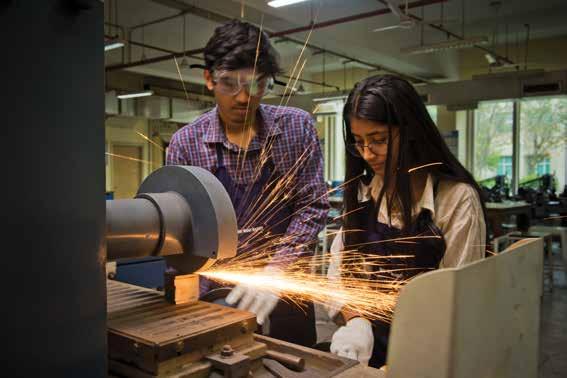
Employing a mixture of traditional and state-of-the-art methodologies to teach the courses. For example, while we practice teaching using a traditional board-chalk method, many courses involve simulation of their physics using platforms like Mathematica or MATLAB.
Representative Courses*
Manufacturing Science, Computer Integrated Manufacturing, Material Science and Engineering, Computational Fluid and Solid Mechanics, Mechatronics & Control Systems, CAD & CAM, Refrigeration and Air Conditioning, Fundamentals of Hydrogen Fuel cells, Solar Energy, Kinematics and Dynamics of Machines, Mechanical Engineering Design and Graphics, Power Plant Engineering, IC Engines and Automobiles, Industrial Automation and Robotics.
*This is not an exhaustive list. The courses given in this booklet are reviewed every semester based on the requirement of the program. New courses are added every semester.
Mechanical Engineering plays a significant role in structuring and building the systems used in the real world. Mechanical engineers play a crucial role in designing and manufacturing these systems. The career path of a mechanical engineer is primarily determined by an individual's choice – a unique advantage in an ever-changing competitive world. The mechanical engineering curriculum focuses on material science, solid and fluid mechanics, thermodynamics and heat transfer, automation and control, design and manufacturing. To summarise, the versatility, wide-ranging scope and universal relevance of mechanical engineering open up career avenues in all possible branches of the engineering profession.
The Department offers the following programs: Bachelor of Technology (B. Tech) in Mechanical Engineering, with the option of minor in any other stream of interest, and Ph.D. in Mechanical Engineering. Our core objective is to develop leaders of tomorrow and conduct translational research to address the significant technological bottlenecks. The Department has developed state-of-the-art laboratories that cater to the undergraduate curriculum and foster research in various specialised and interdisciplinary areas. This creates potential career opportunities in diverse areas within an industry, government and R&D, such as automotive, railways, power generation, environment, and medical and manufacturing industries. To achieve this goal, the Department is absorbing the best talent globally by hiring faculty members with wide-ranging experience in academics and research as well as industry. In addition, we are focusing on collaborations with various industries to design relevant curricula and to provide students with exposure to the real world.
Name & Designation Research Interests
Dr. Harpreet Singh
Professor and Head, Ph.D., Indian Institute of Technology Ropar, India
Dr. Santanu Mitra
Professor, Ph.D., Indian Institute of Technology Kharagpur, India
Dr. Divya Shrivastava
Associate Professor, Ph.D., Indian Institute of Technology Delhi, India
Dr. Harender Sinhmar
Associate Professor, Ph.D., Indian Institute of Technology Madras, India
Dr. Ramesh Gupta Burela
Associate Professor, Ph.D., Indian Institute of Science (IISc), Bangalore, India
Energy Storage Devices; Catalysis; Supercapacitors; Surface Engineering; Friction Stir Processing, Bulk Metallic Glasses (BMGs); High Entropy Alloys (HEAs); Corrosion
Biomimetic Robotics, Intelligent Systems and Vehicles, Sustainable Energy Engineering and Technologies
Name & Designation Research Interests
Dr. Ganeshthangaraj Ponniah
Associate Professor, Ph.D., Jeju National University, South Korea
Humanoid and biomimetic robotics. Quadruped robot. Industrial Automation and Nonlinear control. Fuzzy logic.
Dr. Harpreet Singh Grewal
Associate Professor, Ph.D., Indian Institute of Technology Ropar, India
Reliability Engineering, Operations Management, maintenance management, Statistical Quality control
Solar Energy, Power Tower Plants, Solar Still, Water Desalination, and Alternative Fuels.
Multifunctional composites, High Altitude Airship (HAA), Dimensional reduction of structures using VAM, Multi-flexible body-dynamics, Auxetic material modeling, Nonlinear non-classical effects, Nonlinear Finite Element Analysis, Biomechanics, Solar energy, Computational Fluid Dynamics
Surface modification techniques (thermal spraying, microwave processing, micro / nano - patterning), Tribology (macro/micro/nano), Wetting, Contact mechanics, Biomimetics
Dr. Sathi Rajesh Reddy
Assistant Professor, Ph.D., Indian Institute of Technology Hyderabad, India
Dr. Ankit Gupta
Assistant Professor, Ph.D., Indian Institute of Technology Mandi, India
Dr. Sumit Tiwari
Assistant Professor, Ph.D., Indian Institute of Technology Delhi, India
Dr. Meha Bogra
Assistant Professor, Ph.D., Applied Physics Theoretical Sciences Unit, JNCASR, Bangalore, India
Computational Fluid Dynamics, Multiphase flows, High fidelity simulations, and GPU computing
Computational mechanics, Nonlinear material models, Composite Structures, deformation theories, Imperfection sensitivity, Linear and nonlinear finite element analysis.
Solar thermal (Hybrid solar systems namely, PVT air collector, PVT greenhouse, PVT solar dryer, Green buildings, PVT biogas system, Agrivoltaics etc.), Solar cooling, Heat Transfer
Mechanical Deformation of Materials, Flexibility of crystals, Crystal-to-amorphous transitions, Thermal transport at nano-scale, Thermodynamics of multi-component alloys
Dr. Visakh Vaikuntanathan
Assistant Professor, Ph.D., Indian Institute of Science, Bangalore, India
Multiphase flows, with specific focus on droplet systems encountered in liquid sprays
Bachelor of Technology (B.Tech.) in Chemical Engineering
Specialisations: Biochemical Engineering, Energy and Environment, Modelling and Simulations
Master of Technology (M.Tech.) in Chemical Engineering
Ph.D. in Chemical Engineering
Representative Courses*
Material & Energy Balance, Chemical Engineering Thermodynamics, Fluid Mechanics, Heat Transfer, Mass Transfer, Unit Operation, Chemical Reaction Engineering-I, II, Process Dynamics and Control, Advanced Transport Phenomenon, Chemical Technology, Chemical Process Safety, Transport Phenomena, Numerical Methods, Computational Fluid Dynamics, Process Engineering, Process Modeling and Simulation, Process Equipment Design, Advanced Reaction Engineering, Advanced Process Control, Advanced Thermodynamics, Advanced Transport Phenomenon.
*This is not an exhaustive list. The courses given in this booklet are reviewed every semester based on the requirement of the program. New courses are added every semester.
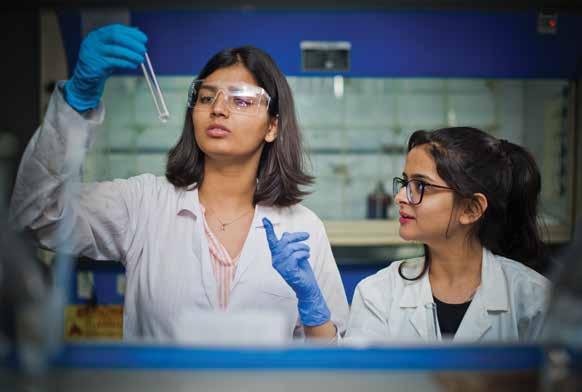
paint, environment, energy, materials, pharmaceuticals, fertilisers, textiles, nanotechnology, etc. Over the years, the discipline of Chemical Engineering has encompassed other non-traditional areas like biology, biochemical engineering, tissue engineering, material science and engineering, bio-energy, and bio-materials in a big way. It has evolved as a truly multidisciplinary area of study. Chemical engineers work in almost every industry and affect the production of practically every article manufactured on an industrial scale. Some typical tasks include ensuring compliance with health, safety, and environmental regulations, researching improved manufacturing processes, designing and planning equipment layout, monitoring and optimising the performance of production processes, and estimating production costs.
The rapid development in technology and the need for sustainable development have given rise to the need to focus on environmental pollution control in manufacturing. The focus on interdisciplinary research equips the students with an in-depth knowledge of all the fields closely related with the major discipline.
Name & Designation
Dr. Sanjeev Yadav
Head & Associate Professor, Ph.D., Indian Institute of Technology Delhi, India
Dr. Rajendra Prasad Chhabra
Distinguished Professor, Ph.D., Monash University, Melbourne, Australia
Dr. V.M Rajesh
Associate Professor, Ph.D., Indian Institute of Technology Delhi,India
Dr. Dhiraj Kumar Garg
Assistant Professor, Ph.D., University of Strasbourg, France
Thermochemical conversion of biomass, Wastewater treatment, Process optimisation
Transport Phenomena, Newtonian Fluid Mechanics, Multiphase Fluids
Multiphase Microfluidics, Computational Fluid Dynamics (CFD), Studies using Open FOAM, CO2 removal studies using Microchannels, Analysis of biodiesel production in microchannels
Thermo-fluids and energy systems, Computational Methods, Mathematical Modelling, Numerical Modelling, Simulation and CFD, Separation Science and Technology, Microfluidics and Nanotechnology, Chemical Reaction Engineering and Catalysis, Process Safety and Process Intensification, Process System Engineering, Green Chemistry
Dr. Yamini Sudha Sistla
Associate Professor & PG Advisor, Ph.D., Indian Institute of Technology Kanpur, India
Dr. Karan Gupta
Assistant Professor & UG Advisor, Ph.D., Indian Institute of Technology Delhi, India
Dr. Priyanka Katiyar
Assistant Professor, Ph.D., Indian Institute of Technology, Roorkee, India
Dr. Ashish Kumar Thokchom
Assistant Professor, Ph.D., Indian Institute of Technology Guwahati, India
Dr. Swaminath Bharadwaj Gourishankar
Assistant Professor, Ph.D., Indian Institute of Technology, Madras, India
Dr. Sanjay Krishnna
Assistant Professor, Ph.D., SVNIT Surat, India
Dr. Ranjit Kumar
Senior Scientist, Ph.D., University of Connecticut, USA
Prof. Devang Vipin Khakhar
Academic advisor, Ex Director IIT Mumbai
Ph.D., University of Massachusetts, Amherst
Biopolymer-based edible films and coatings; Refinery gas and liquid separation Processes; CO2 capture; High entropy alloys; hydrogen generation using Electrolysis and storage; molecular modeling; process modelling and simulation
Instabilities during flow of complex fluids, polymer rheology, polymer processing, non-Newtonian flows in microchannels
Membrane separation, Supercrtical fluid separation, Biomass to Bio energy, Upgradation of Bio-oil, Solid waste management, Industrial pollution abatement, Mathematical modelling, Process optimisation
Fluid dynamics, particle self-assembly, flow visualisation, photolithography, photonic crystals structures, piezoelectric materials, flexible electronic devices, inkjet printing, Micro- and bio-fluidics, Evaporating Drops.
Computational modelling of responsive materials, Solvation thermodynamics, Interfacial phenomena, Statistical mechanics
MD simulations of polymer, Nanomilling, Polymer nanocomposites, Bio packaging
Heterogeneous Catalysis,Catalytic Degradation of Water Pollutants, Functionalization of Metal Oxides,Nanomaterials Synthesis and Application,Nanomaterials for Sensors
Reactor Modelling, Drug Delivery, Nano-composites, Polymer Processing Granular Flow, Rheology, Surfactants
Our students frequently interact with scholars, academicians, and industry leaders during the academic session. Here is a glimpse of guest speakers who have visited Shiv Nadar IoE in the past:
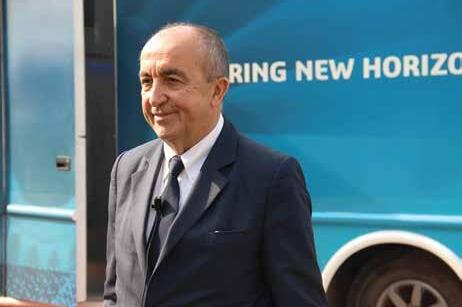

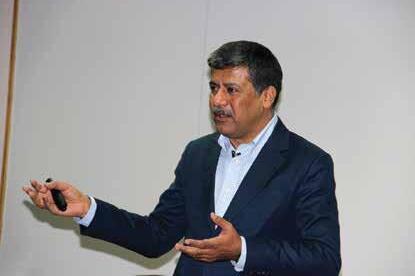
Mr. Philippe Forestier Founding Member and Executive Vice President of Global Affairs and Communities at Dassault Systèmes

Dr. Siddharth Mukherjee Director, Technology, Air Liquide Global E&C Solutions

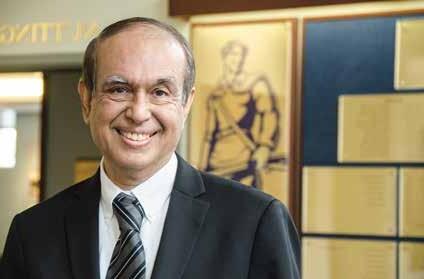
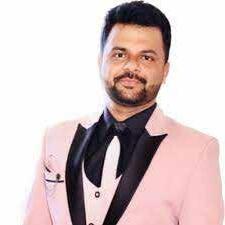
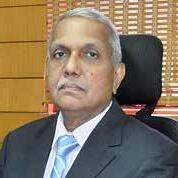
Prof. Atmanand Chairman, Marine Systems Panel, DRDO Govt. of India
Ms. Abha Kumar CIO & Head Global Sourcing, Vanguard, USA Dr. Daljit Singh Former Counsellor (Science & Technology), Embassy of India, Washington DC, USA Mr. Rajesh Janey President & MD, Enterprise – India - Dell EMC Prof. Rakesh K Gupta West Virginia University Pankaj Jadhav National Manager - XR with ARKSchool of Engineering encourages group learning and frequently conducts value-added industrial and academic workshops. A few recent workshops conducted by SoE are:

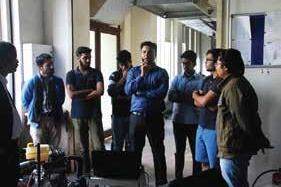
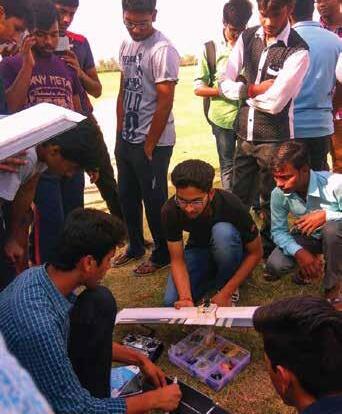
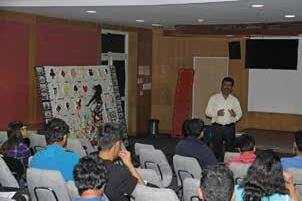
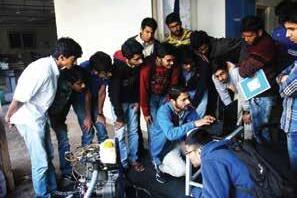
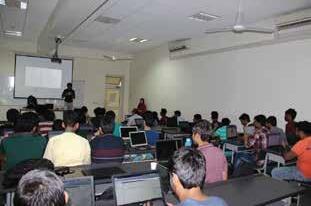

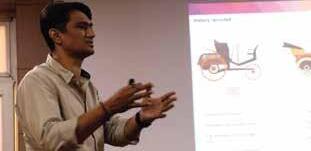
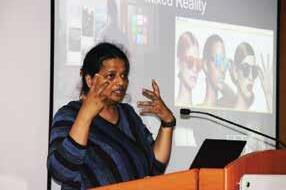 RC Aircraft Design Workshop
RC Aircraft Design Workshop
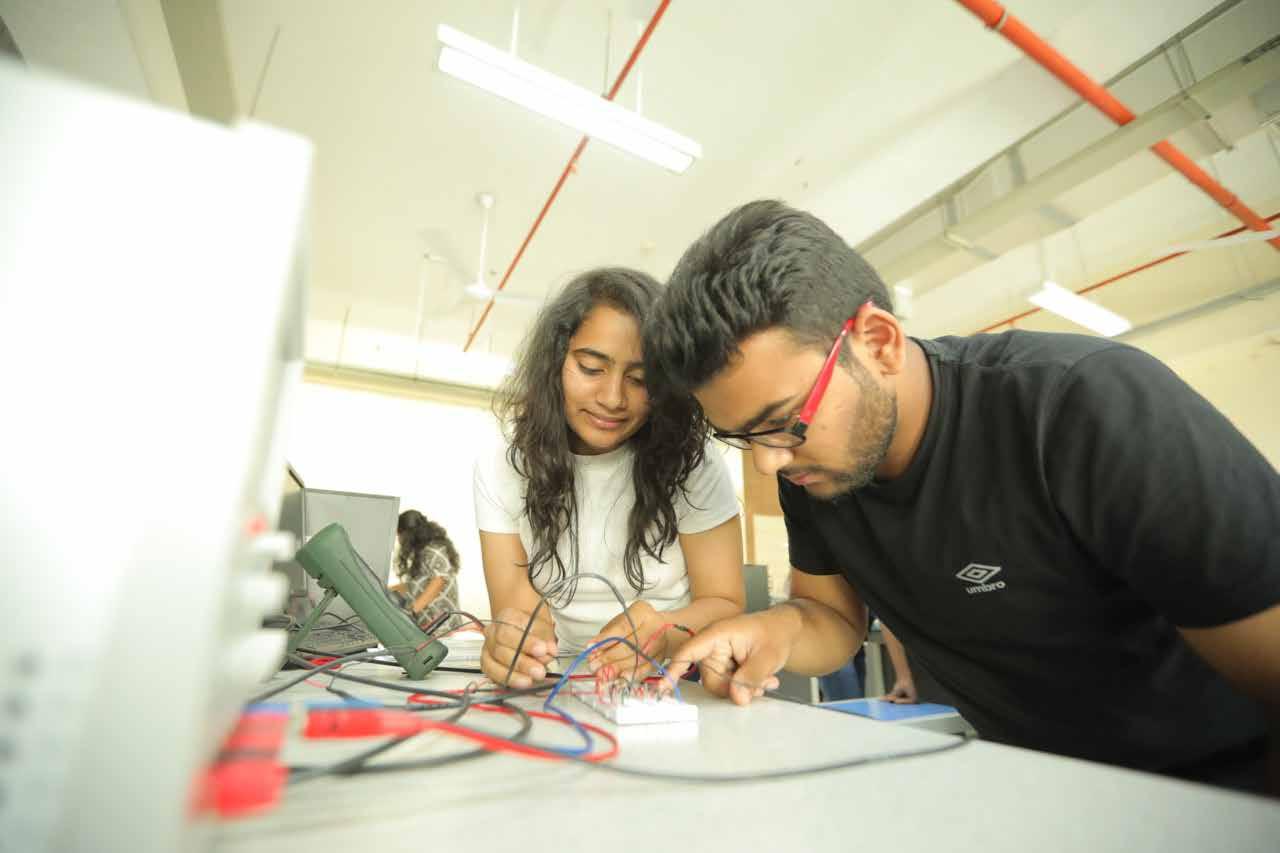
The OUR program aims to give undergraduates hands-on experience in conducting research and doing independent work under faculty supervision. Students explore their curiosity and expand their skills in research methodologies through OUR program, which has helped them (students) win accolades and laurels in research, starting as early as during their undergraduate years. Some of the recent accolades won by Shiv Nadar University students include iGEM (International Genetically Engineered Machine)
2019 competition in Boston, and Smart India Hackathon 2019 'Hardware Complex Category'. In 2020, 72 OUR projects were showcased by students during the 6th Opportunities for Undergraduate Research Conference. Of those, some of the notable projects include:
Out of 130+ OUR projects in 2022-23, 48 were offered by SoE, some notable projects are:
● Developing Protein based Super Hydrophobic Composite Films for Food Packaging Applications
● Crop monitoring in the agricultural fields using satellite remote sensing techniques
● Filtenna Design For 5G Communication
● GaN technology based Wireless charging of EVs and Batteries
● Interface engineering at Hole Transport Layers and Perovskite absorber layer for efficient and stable Perovskite Solar Cells
● Design of Reliability-Aware CMOS based synaptic circuits
● Utilising Sparse Diffusion Measures for Early Diagnosis of Neurodegenerative Disorders:
● Frontotemporal Dementia and Alzheimer's Disease
● Affordance Based Zone Mapping for First Person Action Recognition
● Optimal design of knuckles using AI and Machine Learning
● Conversion of conventional vehicle to Hybrid Electric Vehicle with revamped Battery management system
● Thermally sprayed ceramic coatings with self-cleaning and Anti-Icing behavior
At the post-graduate level too, scholarships, stipends, and tuition fee waivers motivate students to take research as a serious pursuit. The university offers 100% tuition fee waiver; and a stipend of ₹ 50,000 per month for the first two years and ₹ 55,000 per month for the next two years, subject to a specific quality criteria, to its Ph.D. students. The testimony to the quality of research/work carried out by our postgraduate/doctoral students are accolades such as BIRAC-SRISTI GYTI (Gandhian Young Technological Innovation) Award – 2019, and IUCr (International Union of Crystallography) Young Scientist Award – 2019.
Industry and Academic Placements The Career Development Center (CDC) supports students in shaping and managing their careers effectively by helping them identify career choices, providing insights into the latest industry trends, and arranging industry conclaves, industry visits, and boot camps. Since our first batch graduated in 2015, our students have showcased high academic caliber by securing admissions in leading national and international universities like Cambridge, Northwestern, Boston, and Massachusetts.
Apart from that, most of the batches have received job offers from leading multinational companies. Some of the top recruiters for SoE students include Ernst & Young, Deloitte, Goldman Sachs, and Ericsson, etc.

* Select Industry and Academic Placements



As a research institution, Shiv Nadar University, Delhi-NCR has garnered much attention from national and international media. The outstanding research, and discoveries led by the University faculty and researchers have been covered by various media houses. Here, we give you a glimpse of the headlines we have been making:
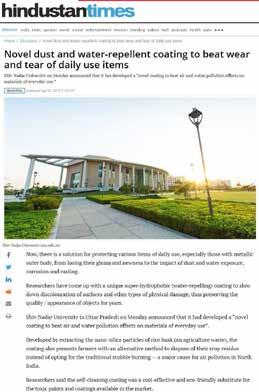
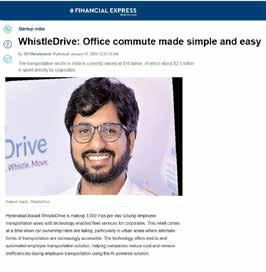
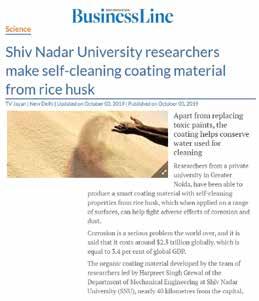
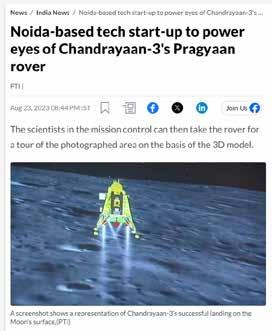
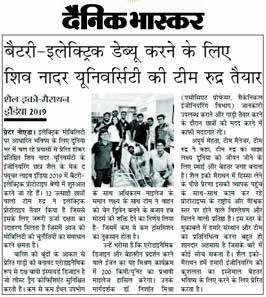 Harpreet Singh Grewal
Harpreet Singh Grewal
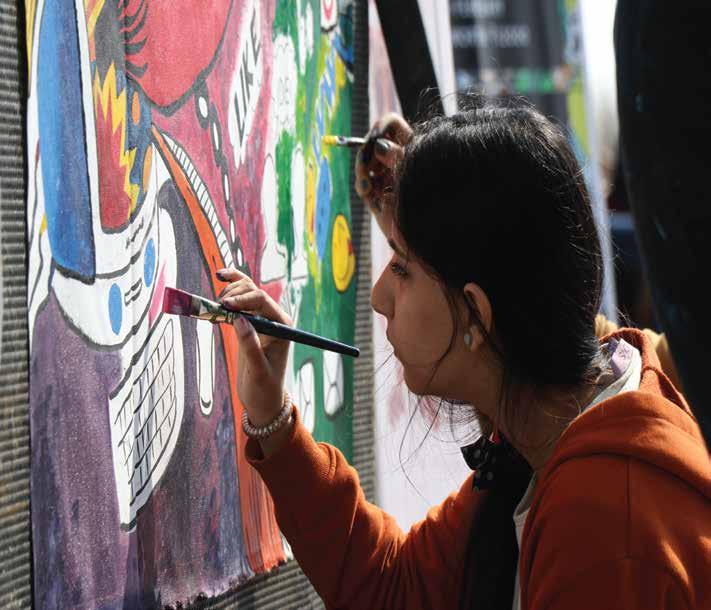
Shiv Nadar University is a fully residential institution with well-equipped laboratories, smart classrooms, and a state-of-the-art library. In its pleasant surroundings, students from across India and abroad share their experiences and values, and gain an understanding of different cultures. Students engage in activities beyond the classroom in team-based projects. They form clubs and societies, organize festivals and events, participate in University administration, take up social projects around the campus, and pursue sports and hobbies. There are currently over 50 vibrant student societies, ranging from the curriculum related Robotics Club - Roboyantriki to the Photography Society - Visually SNU, which periodically conduct events, talks, and competitions to actively engage students not only from Shiv Nadar IoE but also from different parts of the country.
155 Labs and Studios
50+ Clubs and Societies 20+ Sports Courts 400+ On Campus Jobs Offered
120,000 sq.ft.
Indoor Sports Complex
28 States and UTs represented by students
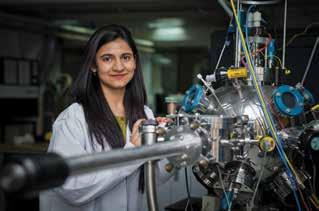


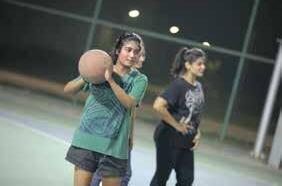
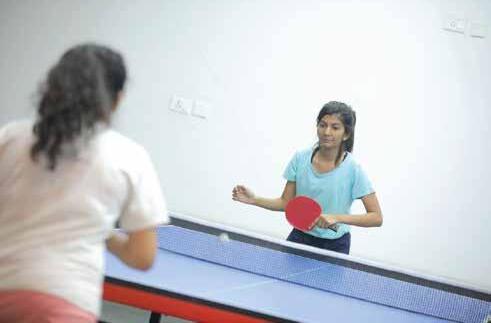


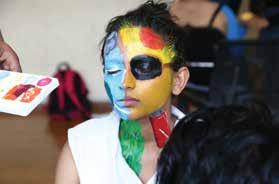





Recognized as an Institution of Eminence 1 of the only 4 private universities in the country to be designated as an Institution of Eminence by the Government of India
National Instutional Ranking Framework (NIRF) Youngest university to be ranked among the top 100 of NIRF, 7 years in a row
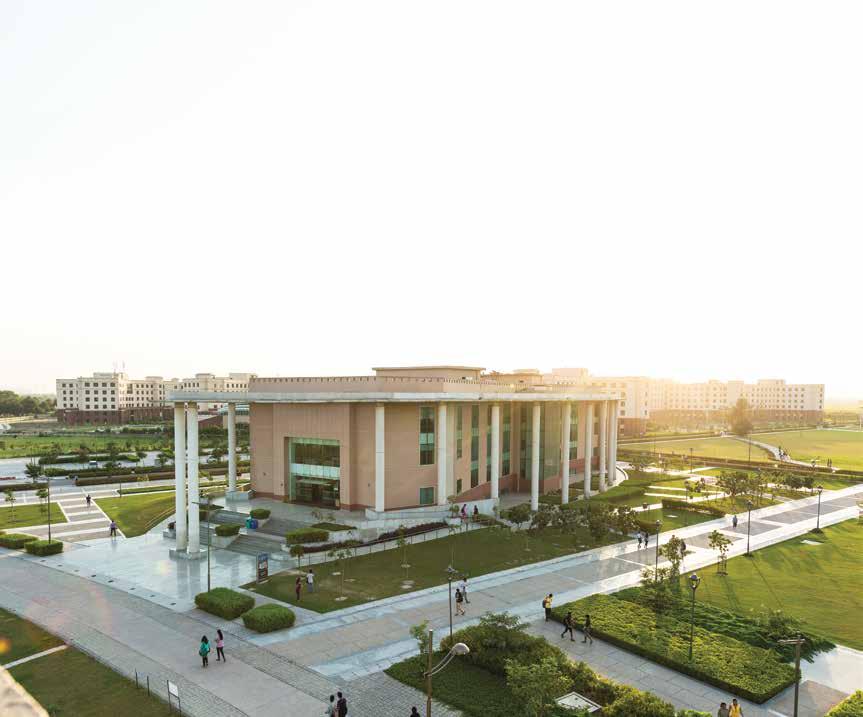
#21 Biological Sciences #28 Chemistry (Nature Index India 2023 ranking of Indian academic institutions)
Global Top 200; India Top 5 SDG 6: Clean water and sanitation Times Higher Impact Ranking 2023
QS Asia Ranking 2024 41 in India; amongst top 36% in Asia
#1 India’s best young university (Careers 360, 2023 ranking of private universities)
Global Top 300; India Top 6 SDG 7: Alternative and Affordable Energy Times Higher Impact Ranking 2023
